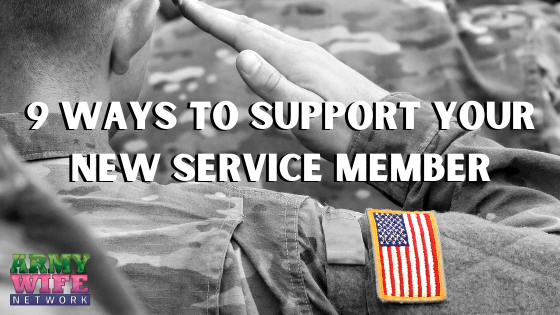1. Spend time (or stay connected with their family if you are comfortable doing so.)
Let your service member know that’s your plan. It will show them you are committed to trying out the relationship by getting to know them. My then-boyfriend, Tom, left just days before Valentine’s Day. I spent the evening with his parents at his mom’s invitation. The subsequent weeks were scattered with other bonding moments: making care packages, going for mani/pedis, dinners, yoga, and more.
Spending time with his family worked out well for me because I knew it was important to Tom that we get to know each other, and I happened to live just a few minutes down the road from his parents and sister. If you don’t live close by and would still like to stay in touch with your partner’s family, consider calling or even traveling for a visit.
3. Find out if there is a Facebook page.
My husband went to Fort Leonard Wood, and they operate an active Facebook page. When Tom was there in 2015, there was a post every day where loved ones could type short messages to their soldiers, and they would receive them at mail call. Be warned that these messages were Shout Outs (yes, shouted out loud for everyone to hear), so avoid anything explicit or embarrassing.
There were also photos and updates of what the soldiers were doing, which can help you feel like you’re part of your soldier’s day-to-day life even though you’re not seeing him or her.
4. Learn about the branch in which your service member enlisted/commissioned.
Most people I knew growing up had Navy in their blood, so I had to do my research on the Army. I may have put the Army Song on loop on YouTube and memorized the whole thing. I even managed to impress my then-boyfriend, who didn’t know that there was more than one verse!

I actually taught him the rest of it.
But go beyond that. Learn about the culture, the installation they’re training at, their chosen MOS, or anything else that helps you understand what your service member is going through.
BROWNIE POINTS: I also spent time researching what it’s like to be a military spouse. A lot of it is subjective, but I wanted to have some idea of what I would come across in terms of separations and culture, if we got married. I found some invaluable bloggers:
I will say that these bloggers are some of the most informative and encouraging.
Know that not every blog you find will have a positive spin on military life, and it is easy to go down that rabbit hole, which brings me to my next point…
5. Don’t jump to pessimistic thoughts.
If you haven’t dated someone in the military before you won’t know what it’s like because you haven’t experienced it yet. Even if you grew up as a military child, it’s a different experience when it’s your significant other rather than a parent. Remember, you’re only dating. It’s important to try it out, so that you can know for sure one way or the other. Realizing that it was important to stay positive and open to trying out at least what dating life was like in the military community was a huge milestone for me.
6. Go to Family Day and Graduation
You’ve waited 11 weeks to see your significant other. Go! Show them that you’re proud and excited for then. Showing up tells them you missed them and wanted to be a part of this milestone. If you can’t afford the ticket or if the pandemic doesn’t allow for in-person events, see if there is a way to participate virtually. Hopefully after, your service member will have access to a cell phone, and you’ll be able to share your excitement that way.
7. Know that others will want to witness these events too.
Coordinate with your service member’s family. If you can travel together, you might save some money on food or a room if you are comfortable with it. Being open to sharing your service member’s time with their family or friends will make it easier for your service member. They are less likely to feel as stretched thin if you are all willing to be together.
Along the same vein, know that not every service member’s family will be able to attend the events.

Tom and his battle buddy on Family Day.
Your loved one may ask to bring a battle buddy or two along if you go out for a meal or something—this was the case for me. At first, I was disappointed because I didn’t want to share Tom’s attention with anyone other than his parents. I got over it quickly, though, when his friend shook my hand and said, “So, you’re the one Krieger’s been going on non-stop about. Nice to meet you!” He ended up joining in on the storytelling when we all sat down to dinner that night. I remember smiling to myself, grateful that he came along.
8. Find a restaurant near the installation for an after-graduation meal.
Whether your service member will be allowed to leave for a while after the events depends on many different factors, but it’s good to have an option. Choose somewhere that’s within 10 or 15 miles because they will likely have a certain travel radius that they need to stick to. This is so important because your service member spent a lot of time thinking and making decisions over the past 11 weeks. This gives them a break.
9. Try to find out on that Facebook page if your service member will need to stay in dress uniform even after the events.
If not, bring an extra set of clothes for them to change into for the few hours that you’re all together. Also, find out if the hotel has a pool, and bring swimsuits!










0 Comments